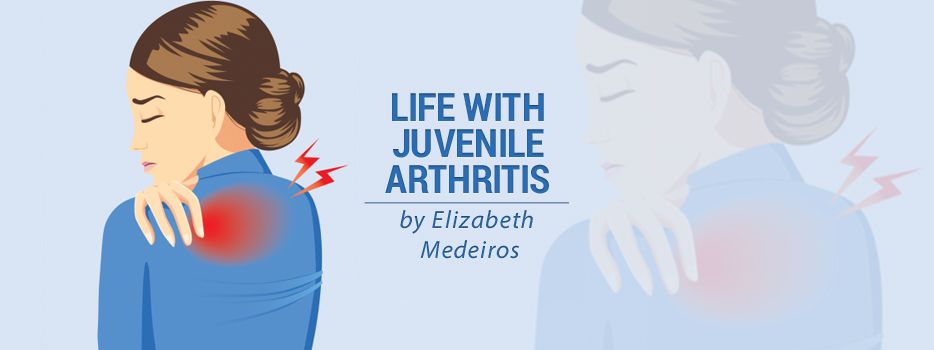When I was a preteen and teenager, there were plenty of ways I tried to hide or change who I was. Like lots of teenagers, I used things like clothes and music as a way to fit in, and I hid away parts of myself I didn’t like. But as I got older, I wanted to start breaking down those walls to let people love me for who I am, juvenile arthritis and all.
When I started being more honest about myself and my limits, I noticed fair-weather friends came and went. But by being honest, I had some beautiful friendships and relationships blossom, including one with Nick.
Nick always let me talk openly about my struggles and reassured me that even the parts I don’t like about myself are still deserving of love. He quickly became my best friend, then my boyfriend, and now my fiancé.

The struggle of feeling worthy
While people who live with JA can and do lead everyday lives, they need supportive people in their inner circle. So often, the world asks you to grin and bear the pain to keep the peace. There are lots of times you feel like you can’t ask for help or rest because you don’t look like you need it.
But it can be so easy to feel like you’re not worthy of that love when you have a chronic illness. Since my teen years, I’ve felt so much doubt in myself, especially when I’m in a JA flare. Having to say no to plans, dropping the ball, not meeting others’ expectations, and just generally living at a slower pace make me feel like I’m disappointing others. I and many others have lost many friends over these struggles, and I sometimes lose confidence in being able to be a good friend.
Rather than reaching out for help, those feelings made me want to hide away because I was ashamed. I hid away when I felt drained and like I couldn’t be there for others, and only came around once I felt better and could go on with life as usual.
A parent’s role
Feeling ashamed and unworthy is not a good way for anyone to live, and relationships should be about the give-and-take. Not only is it unhealthy to feel alone in your time of need, it’s also harmful to feel like the only time you can be around someone is when you can give them all of your support. Everyone needs to be able to love and be loved.
Parents, you are your child’s first line of support. Even as they get older and more independent, they’ll need your guidance.
Not only will you be their rock, but you’ll also be their role model for what to expect in healthy relationships. They’ll learn from you that someone who truly loves them is OK with helping out when they’re not feeling well, as long as they do their best to help when feeling well. And they’ll also learn that while some crankiness caused by pain can be tolerated, yelling or acting out cannot.
Learning about these healthy boundaries will help them in their relationships, now and in the future. They’ll know what to expect from a loving friend or partner and how to reciprocate. It can be challenging for someone with a chronic illness to find real friends, but having a good foundation can help them navigate and find the right people.
We worked through it
It would be a lie to say JA never complicated our relationship. My fiancé and I went through a lot of trial and error in learning how to support each other. It wasn’t always easy finding what worked or coping while we were both pouring from an empty cup. But we made it work because we were committed to each other, learned what we needed to do, and even set some boundaries, making our relationship not just loving, but rewarding, too.
And we couldn’t be happier.
***
Note: Juvenile Arthritis News is strictly a news and information website about the disease. It does not provide medical advice, diagnosis, or treatment. This content is not intended to be a substitute for professional medical advice, diagnosis, or treatment. Always seek the advice of your physician or other qualified health provider with any questions you may have regarding a medical condition. Never disregard professional medical advice or delay in seeking it because of something you have read on this website. The opinions expressed in this column are not those of Juvenile Arthritis News, or its parent company, BioNews, and are intended to spark discussion about issues pertaining to juvenile arthritis.

